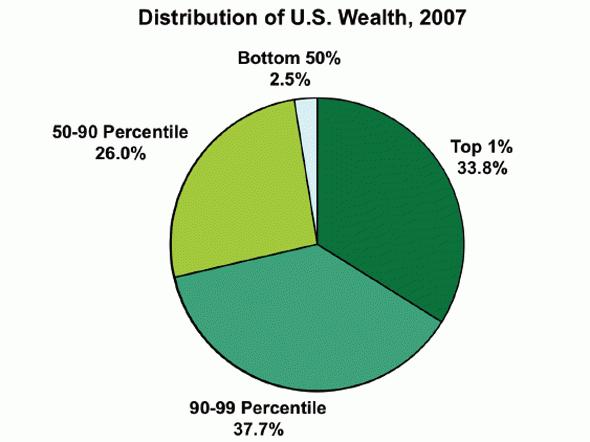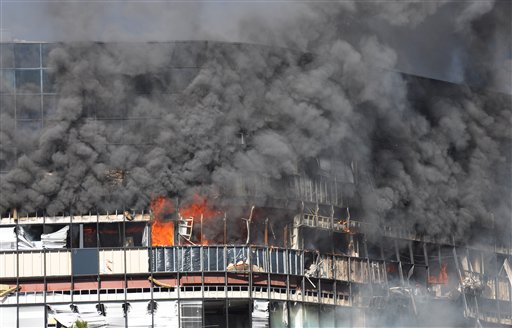
The bottom half of Americans only own 2.5 percent of American wealth and other “shocking” facts of American life.

The bottom half of Americans only own 2.5 percent of American wealth and other “shocking” facts of American life.
Change the names and number of parties and what Lenny says about the UK elections goes as well for the Dutch one a month later:
The 2010 general election will result in a victory for the nasty party, whoever wins. All three major parties, having supported the mammoth bank bailouts, stand for the deepest cuts in the public sector for over 50 years, far outstripping anything accomplished by Thatcher. Outdoing Thatcher in the cuts stakes is, in case the point passed you by, as nasty as can be. The chancellors’ debate – which, underscoring the poverty of alternatives, was won by the drab former Shell economist Vincent Cable – reinforced this quite starkly. There is only a difference of emphasis and timing between the parties, and these differences all sound eminently reasonable and plausible within the terms of the discussion – but they are largely technocratic differences with policy flavours attached.
All parties accept the reality that “we” need to drastically cut expenditure to pay for the bankers’ crisis. All parties accept we can’t really raise taxes on rich people high enough to do so, nor expect the banks to repay us, so it will be the workers who’ll have to pay, one way or another. All that’s left is quibbling about what to cut and how we are going to pay it.
This:
At this point to wring the excesses out of the system and to stop the systemic incentives to keep blowing bubbles is going to require doing something to make it so it doesn’t pay. There are two parts to any solution. The first and simplest way is to put a very progressive tax on all income no matter how or where earned that probably comes in at over 95% of all income over, say, $500,000 or a million at the most. Suddenly, needing to actually keep the companies sound, and knowing that in 7 years when the loans go bad, they’ll still be there taking the heat for it, will tend to concentrate the mind not on “can I make enough money to be in a yacht in 3 years†but into “does this deal make sense over the longrunâ€.
What I’m wondering however is, leaving aside the question of whether there even now is the political will for such a move anywhere, if it is actually possible to tame the financial and banking sector when it’s the driving force in our current economies. The long social-democratic consensus of the twentieth century was made possible because the interests of both industry and workers were served by it, but industry is much less important now. A lot of the economic growth of the past two-three decades was driven by financial services; if these are restricted where will this growth come from and how will our growth addicted politicians and capitalists respond?
John Emerson is tempted into blogging again:
Economics is too ill-formed, inconsistent, and incomplete to be the rigorous formal science it pretends to be. What it is instead is a bag of tricks, many of which work most of the time. Economics functions as a form of expert advocacy, like law. No one says lawyers don’t know anything. They’re very bright and knowledgeable and, in the context of our society, necessary and powerful. They do know a lot, but no one calls them scientists. If economics isn’t alchemy (or unscience), it’s law. Economists are highly skilled mercenary advocates within an sloppy, open system which is always in the process of redefining itself. And like most mercenaries, economists are most sympathetic to those who can afford them.
As often, the comments are as good as the post.

Last thursday a man flew his plane into an IRS building in Austin, Texas and the worst part about it is that it didn’t come as a surprise or shock. I’ve been expecting something like this to happen for some years now and my first thought was that this is what you get when you have an rightwing Democrat in the White House more interested in buying off bankers than getting health care for ordinary Americans and an opposition movement driven by emotion and barely sublimated racial hatred. That the first target would be an IRS building is not surprising either — few people like a visit from the taxman and taxation has been a bugbear of wingnuts as long as the US has existed. It seemed likely this was some raged-up teabagger made mad by repeated exposure to Glenn Beck
But it turned out Joe Stack was somebody much more dangerous. His suicide note was of course selfserving, but far from loony. His lifestory as presented there could be the story of millions of struggling middleclass people, grown up with the belief that hard work and smarts would make him rich, only to be knocked down time and again by circumstances outside his control, as well as the simple fact that he wasn’t as smart or crafty as he thought he was. He saw how the big boys behaved and thought he could do the same, only to be smacked down because he couldn’t. His was the rage of the little man, the one who can never catch a break, always gets caught when he tries to cut a corner yet sees others get away with murder.
The resentment he felt is on clear display in passages like this “Why is it that a handful of thugs and plunderers can commit unthinkable atrocities (and in the case of the GM executives, for scores of years) and when it’s time for their gravy train to crash under the weight of their gluttony and overwhelming stupidity, the force of the full federal government has no difficulty coming to their aid within days if not hours“. The sheer dichotomy between his own experiences and what he sees on the news each evening is what fuelled his rage, something surely we’ve all shared at one point or another. I certainly have. In Stack’s case, this rage finally metamorphosed into action. Sadly, if fittingly, this action was against the wrong target killing the wrong people. He gets angry at multibillionaires and ends up murdering the same people as him just because they work for the IRS.
Joe Stack won’t be the last angry middleclass white dude going for a spot of self destructive terrorism. The economic crisis and the blatant way in which the system is being gamed will see to that. Wall Street may think the recession is over or almost over, but for millions of middle class families barely holding on it is just beginning. They are the ones who have the most to lose from it, they are the ones whose anger and rage will stoke more of these atrocities, is stoking the teabagger movement and which will make sure shit will be burned down if better alternatives will not emerge.